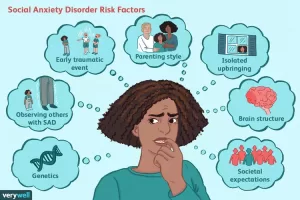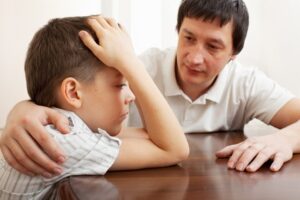Social anxiety in children and teens can be difficult to manage, particularly due to the fact that the majority of their day is spent with peers. From school to sports or extracurricular activities, children and teens are constantly surrounded with social demands and expectations. For children and teens who find these interactions difficult, anxiety may become significant and can impact overall daily functioning.
Social anxiety affects approximately 15 million American adults and is the second most commonly diagnosed anxiety disorder. Social anxiety disorder is an intense anxiety or fear of being judged, negatively evaluated, or rejected in a social or performance situation. As a result, individuals often avoid social or performance situations; If these situations are unavoidable, significant anxiety and distress surface.

How Does Social Anxiety Develop?
Social Anxiety can develop for a variety of reasons. The following are possible causes.
- Genetics: Some children and teens are predisposed to anxiety as a result of genetics. Parents and
 extended family members may have struggled with anxiety in their life and can pass it down to their children.
extended family members may have struggled with anxiety in their life and can pass it down to their children. - Environment: Children and teens may feel a sense of unpredictability in their environment due to lack of routine, structure or other such stressors. If members of the immediate family struggle to manage their own emotions or do not provide needed support intentionally or unintentionally, children can feel insecure; thus leading to feelings of anxiety.
- Stressful/Traumatizing Events: As children grow and develop, they have a variety of relationships with others. Negative relationships with peers and adults make coping with stressors difficult. Common examples of stressful events include bullying, continued peer conflict, embarrassment, difficulty making friends/fitting in and poor parental relationships/support.
- Personality: Children and teens who tend to be more introverted or shy may feel a sense of pressure to interact in a world that is often inundated with extroverts. Introverts tend to need more time to themselves to recharge their social battery and reflect on their own needs. The constant demand to socially interact and connect can cause stress, anxiety and a sense of frustration.
- Negative Thinking: Children and adolescents may engage in negative thinking patterns to include worry or judgment from others. Many children and adolescents wonder if they are good enough. They wonder if another person is talking about them in a negative way and may compare themselves to others. This comparative suffering and concern regarding judgment hinders self-esteem, growth and connection to others.
The factors listed above may impact an individual’s ability to feel comfortable in social situations and may lead to social anxiety and stress when asked to do so. As a parent, there are steps you can take to help your child reduce symptoms of social anxiety.
How Can Parents Help Their Child Cope With Social Anxiety?
- Listen, Validate & Empathize: When your child voices their fears and worries, be sure to
 let them talk without interrupting. Ask questions. Allow them as much time to explain their thoughts as needed. Validate their feelings. Even if you believe that their anxiety is unreasonable, tell them that you are sorry they are feeling in such a way. Show empathy and kindness through the tone of your voice, body language and facial expressions.
let them talk without interrupting. Ask questions. Allow them as much time to explain their thoughts as needed. Validate their feelings. Even if you believe that their anxiety is unreasonable, tell them that you are sorry they are feeling in such a way. Show empathy and kindness through the tone of your voice, body language and facial expressions. - Assist Your Child In Identifying Coping Strategies:. Walk them through ways that they can manage their anxiety should it arise: deep breathing, breaks, sit in a quiet space to calm, use distractive techniques to shift the focus. Model these approaches and assist them in understanding themself well enough to know which technique will help them best.
- Lifestyle Changes: Engage in healthy living. Be sure that your child has a good sleep schedule and practices good sleep hygiene. Turn off screens an hour before bed, take a shower, relax and meditate. In addition, provide healthy food and time to exercise during the day.
- Be A Role Model: Model coping strategies to assist you in calming down when you are feeling overwhelmed or anxious in social situations. Allow your child to watch how you manage your emotions appropriately.
- Praise: Recognize when your child is interacting with others, trying their best and attempting to manage their social anxiety.
- Therapy & ERP: Ask a therapist to help, particularly utilizing ERP. ERP is a therapeutic approach in which a therapist gently exposes an individual to an anxiety producing situation. The goal is to easily access coping mechanisms during symptoms of distress as it relates to social anxiety.
If your child is experiencing social anxiety, there is hope. Although the pain from isolation and disconnection is a challenge, you can calm these anxieties with the right support. As a parent, be sure you make every effort to understand your child’s needs. Help them cope and seek out additional support should you need it. You don’t have to manage this alone!

Other Therapy Services We Offer in Maryland & the Washington DC Area
At Crystal Waters Counseling Centers we offer a variety of in-person and online therapy services. They are available for children, teens, college students, women, and adults throughout Maryland. This includes counseling for both anxiety and depression. As well as EMDR Therapy, therapy for life transitions, and parent coaching.

